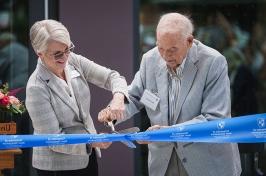
A group of social work students from the College of Health and Human Services traveled to Ireland last summer to visit social service agencies, trauma centers and universities. (Courtesy photo)
As an Irish man named Alan McBride who lost his wife during the Troubles recounted his experience at the Wave Trauma Center in Belfast, Ireland, a moved Mikayla Tobin ’26 looked around the room and noticed something looking back.
A room full of shimmering eyes.
“His wife was killed, but he wasn’t resentful,” Tobin says. “He just wanted to create a safe space for others to heal. It was so powerful; everyone in the room had wet eyes.”
Tobin was one of 12 social work students from UNH’s College of Health and Human Services who spent almost two weeks in Ireland last summer as part of a social work department bi-annual trip, visiting social service agencies, trauma centers and universities.
Stories like Alan’s are what make the trip so impactful, says Trish Cox, clinical associate professor and director of the UNH master’s in social work program, as the aspiring social workers – a group made up of undergraduate and graduate students – get a chance to experience powerful real-world interactions that simply aren’t replicable in a classroom.
“I’ve had the privilege of teaching this class four times, and it has truly been the highlight of my teaching career. The transformative experiences it provides our students are extraordinary,” says Cox. “Through the program, students are able to draw meaningful parallels between the Irish and U.S. social welfare systems. They gain a profound understanding of the critical role relationships and people’s stories play in a nation still in the process of healing.”

The experience certainly resonated for Tobin, who said the trip provided valuable insight into Ireland’s mental health landscape and motivated her to delve deeper into the issue in her home country.
"There’s a cultural reluctance to talk about mental health issues, which I think often overlaps with what we see in America," Tobin says.
For Kat Antczak ’26G – and several others who made the journey – the trip was her first opportunity to travel abroad. One of her biggest takeaways was the focus on the importance of being an active listener.
"Every person we met said active listening was the most important part of social work,” Antczak says. "That really stuck with me.”
Antczak was particularly inspired by the work of a local homeless services agency that continuously expanded its services to better meet the needs of its clients. Witnessing that sparked a desire in Antczak to perform more advocacy in social work.
"I’ve worked at a homeless shelter before and often felt my ideas were dismissed. Seeing how services in Ireland strive to improve was inspiring," Antczak says. "It reinforced my commitment to client advocacy."
That is precisely the kind of takeaway the faculty organizers of the trip hope student can leave with.
“As students engage with agencies aligned with their interests, they leave with innovative approaches to addressing social issues,” Cox says. “This fosters a more empathetic and globally aware perspective when working with clients.”
The trip is facilitated in part by two scholarships from retired UNH social work professors, Cox says, which covered a significant portion of students’ fees. Her goal is to achieve full coverage through additional support in the future, as many students who join the trip have never traveled internationally, and grants and scholarships help make that attainable.
The bi-annual 12-day journey is attached to the SW 785/885 course called Comparative Social Welfare Systems: Dublin and Belfast, focusing on the “Irish/Anglo troubles.” The class was originally created by Martha Byam, who led it for many years before retiring.
In the 1990s, Byam was struggling to find ways to bring her Social Welfare Policy and History course to life when an encounter with a student who had just returned from the London Regent’s College program sparked an idea.
“Talking with her made me realize we could make the history and the policy analysis objectives of the course come alive by taking them to actually experience the beginnings of the modern welfare state,” Byam says.
That prompted the first international trip, a journey to London in the mid-1990s with 16 students. After about 10 courses taught in London – the course was offered every two years – Byam and Martha Ortman taught two courses in Scotland comparing the effects of the Industrial Revolution on people’s welfare, contrasting it with the Merrimack Valley in Massachusetts.
The course went back to London again before Byam and Robert Jolley, a former social work department chair, started the Ireland program somewhere around 2013.
“We maintained the comparative policy practice aspect of the course but refined it for Dublin and Belfast to examine the Troubles and its ongoing impact on the population of Ireland and Northern Ireland,” Byam says. “There are striking parallels between the Troubles and the racial issues of the U.S. It is a powerful experience for students – and faculty – learning how to work with conflict.”
This summer’s trip certainly illustrated that power. Among the most resonant experiences for Gretchen Bean, clinical associate professor of social work and expected co-leader of the next trip in 2026 alongside Patrick Shannon, were the visit to the Wave Trauma Center where Alan shared his story and a Black Taxi Tour in Belfast, which was “delivered in a culturally responsive manner by people with first-hand experiences from the neighborhoods we visited.”
Those moments were not only moving but truly drove home the lasting benefit students on the trip can gain from stepping out of the classroom and experiencing things themselves.
“It was a sobering account of the Troubles and the impact of violence on their lives,” Bean says. “It made the history come to life in a way that preparatory readings could not.”
-
Written By:
Keith Testa | UNH Marketing | keith.testa@lakeviewbungalow.com


















































